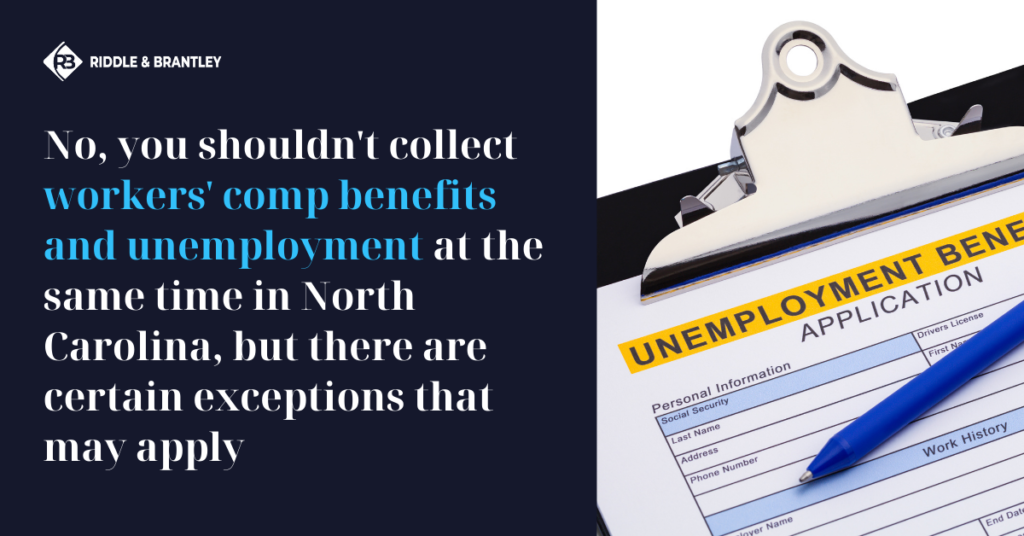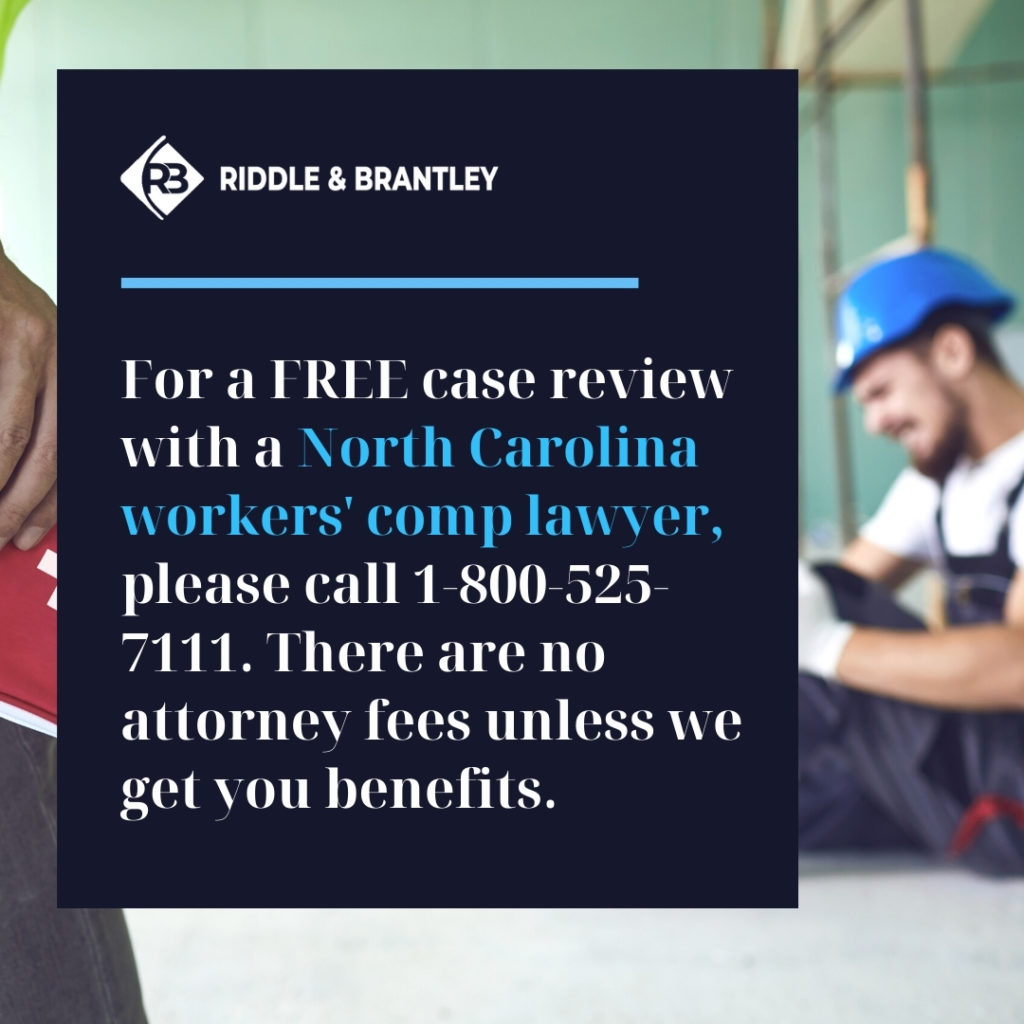“Can I get workers’ comp and unemployment benefits at the same time in North Carolina?” The simple answer is no, you should not collect workers’ compensation benefits and unemployment at the same time. However, in the real world, the answer is not always so cut and dry.

In this article, we’ll detail what you should know about claiming workers’ compensation and unemployment benefits at the same time in North Carolina, as well as how to get help from a North Carolina workers’ comp lawyer if you’re filing a claim.
If you’ve been injured on the job and are seeking workers’ compensation or have questions about workers’ comp and unemployment benefits, call our experienced North Carolina workers’ comp lawyers today at 1-800-525-7111. We also have Social Security disability lawyers available to help with claims for long-term disability.
For more information on workers’ comp in North Carolina, be sure to check out our workers’ compensation FAQ page.
Workers’ Comp vs. Unemployment Benefits
The North Carolina Workers’ Compensation Act is designed to compensate individuals who are unable to work due to a disability sustained in the course and scope of their employment.
Unemployment benefits, on the other hand, are designed to compensate individuals who are unemployed due to no fault of their own and who are “physically able, available, and actively seeking work.”
But can you actually get workers' comp and unemployment at the same time in North Carolina? And is it actually legal?
Example: Bob the Warehouse Worker
Take the example of Bob, a warehouse worker who is hurt on the job. Bob files a workers’ compensation claim and his claim is accepted. He treats with an authorized treating physician assigned to him by the worker’s compensation insurance adjuster for his employer’s insurance company, and he eventually has back surgery. Bob goes through rehab and finally is released by his treating physician at maximum medical improvement. Bob’s doctor assigns him permanent restrictions including no lifting over 30 pounds. He still needs to take muscle relaxers, but otherwise he is released from medical care. His doctor says he doesn’t need to come back to him unless his back flares up.
Bob’s employer tells him that he cannot come back to work because his job requires frequent heavy lifting. Bob knows that there are other jobs that he could do, so he starts applying for jobs but he cannot find anyone to hire him. When Bob submits his applications, he doesn’t say anything about his recent back surgery, but he suspects that employers might know he has been out collecting workers’ compensation benefits and that they are reluctant to hire him. Of course, no employer actually tells him this because North Carolina is an “at will” employment state and no one has to give you a reason for not hiring you.
Bob wants to work. He doesn’t like collecting workers’ compensation checks when he knows there are jobs that he could do. Plus, Bob isn’t receiving very much in worker’s compensation checks. Bob was only working in the warehouse for 5 months before he got hurt, and although he would probably have started getting more hours soon if he had not been hurt, the fact is that he was only working around 25 hours a week when he got hurt. So his weekly workers’ compensation checks don’t add up to very much.
Applying for Unemployment While Receiving Workers' Comp
Bob goes online to the North Carolina Department of Commerce’s website and clicks on the page for the N.C. Division of Employment Security.
He creates an account and enters his information. The website quickly tells him how much he would get if he started collecting unemployment benefits. Bob learns that if he were collecting unemployment benefits, he would be getting more money than he’s been collecting through workers’ comp. This is because the unemployment system looks back at his earnings at the job Bob had before he worked at the warehouse. He worked more hours at his last job.
Bob thinks it is unfair that he is getting less money than other people who got laid off. Bob didn’t do anything wrong to get hurt, but he’s getting less money just because of bad luck. He wishes his boss had just laid him off.

Then Bob realized, he actually was laid off in a way. He is not unemployed through no fault of his own. He is able to work some jobs, just not in the warehouse. His boss could probably even bring him back in some other positions that don’t require so much lifting, but they probably just don’t want to bring him back because he’s a risk to hurt his back again. Bob realizes that he meets the definition of unemployed set out on the North Carolina unemployment website. So he applies for unemployment benefits. He uploads a copy of his driver’s license and enters the info on the jobs he has been applying to over the last few weeks.
In a couple weeks, Bob gets an email. He has been granted unemployment benefits! Money has already been deposited into his checking account for the six weeks he’s been out of work since his doctor released him! The notice tells him he can also apply for Medicaid health insurance or for a health insurance plan through the Affordable Care Act marketplace. Bob is really excited because he has some other health issues besides his back and he could really use health insurance.
But then Bob gets really worried. He’s also been collecting workers’ compensation benefits during this time. Did Bob just do something wrong? Does he owe money back? What about his medical care? Workers’ comp is still paying for his prescriptions. Does he have to start paying for those out of his pocket? Is he supposed to get health insurance and start having them pay for his medical care if he needs to go back to the doctor?
Laws Concerning Workers' Comp and Unemployment in North Carolina
Bob starts reading on the internet and finds N.C.G.S 97-42.1. It talks about credits and how he might have to pay back the money he has been getting through workers’ comp. But it says this only applies to people who are working one job and are receiving temporary total disability. It says this rule does not apply to people who are receiving temporary partial disability or permanent partial disability. Bob has absolutely no idea what those terms mean.
Have You Been Injured on the Job?
If you’ve been injured on the job and are seeking workers’ compensation benefits, or you’re already receiving benefits and have questions about receiving unemployment benefits at the same time, please call our North Carolina workers’ compensation lawyers today. Our attorneys have more than 220+ years of combined legal experience and we've recovered millions of dollars in compensation for victims of workplace injuries since 1985 (see disclaimer below).
"I would like to thank Riddle & Riddle for doing such a great job handling my workers' compensation case."
-Gregory S., Riddle & Riddle client
There is no obligation, and you won’t pay a dime in attorney fees unless we win your case and you receive workers’ compensation benefits.
Call 1-800-525-7111 and let one of our Board-Certified Specialists in Workers’ Compensation review your workers’ compensation claim today.
Justice Counts for North Carolinians injured while on the job. We understand this process can be intimidating and confusing and we are ready to help however we can.
*** Disclaimer: The results mentioned are intended to illustrate the type of cases handled by the firm. These results do not guarantee a similar outcome, and they should not be construed to constitute a promise or guarantee of a particular result in any particular case. Every case is different, and the outcome of any case depends upon a variety of factors unique to that case.